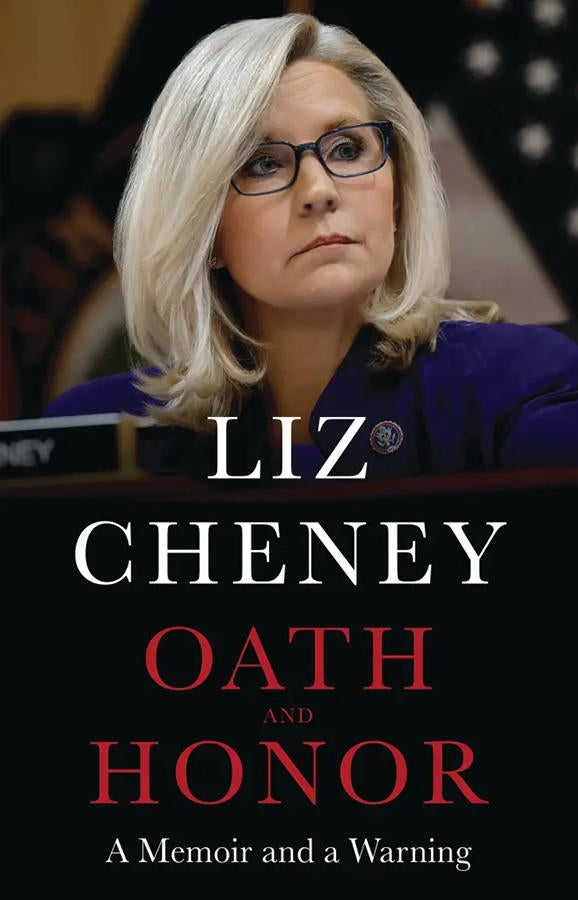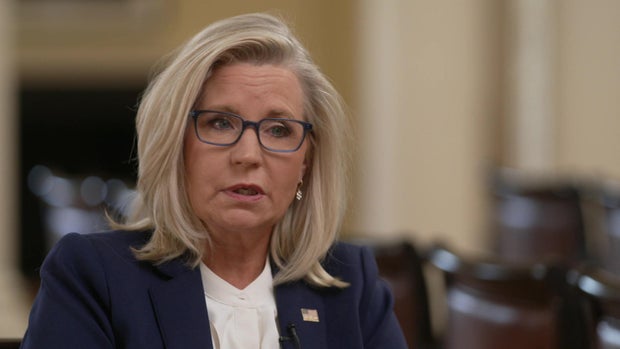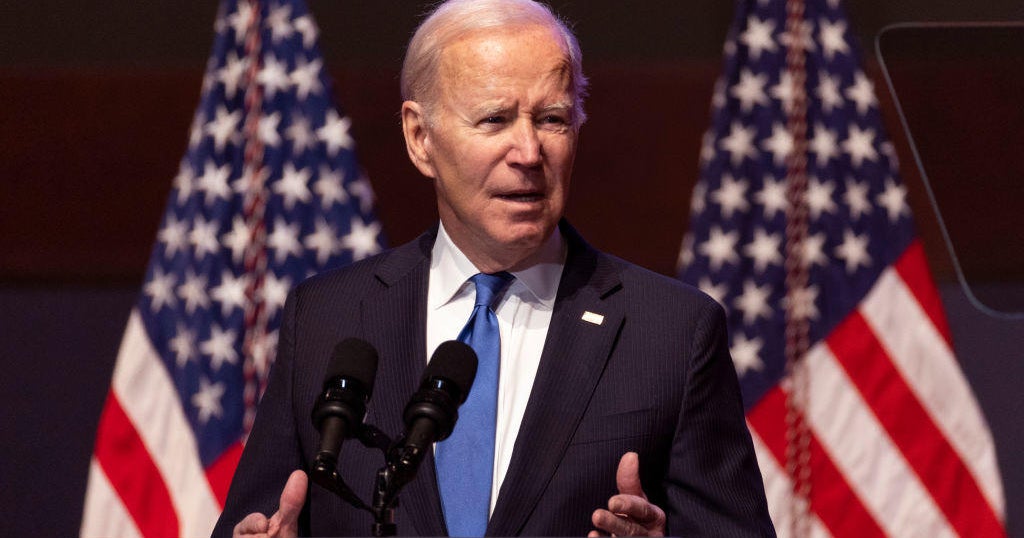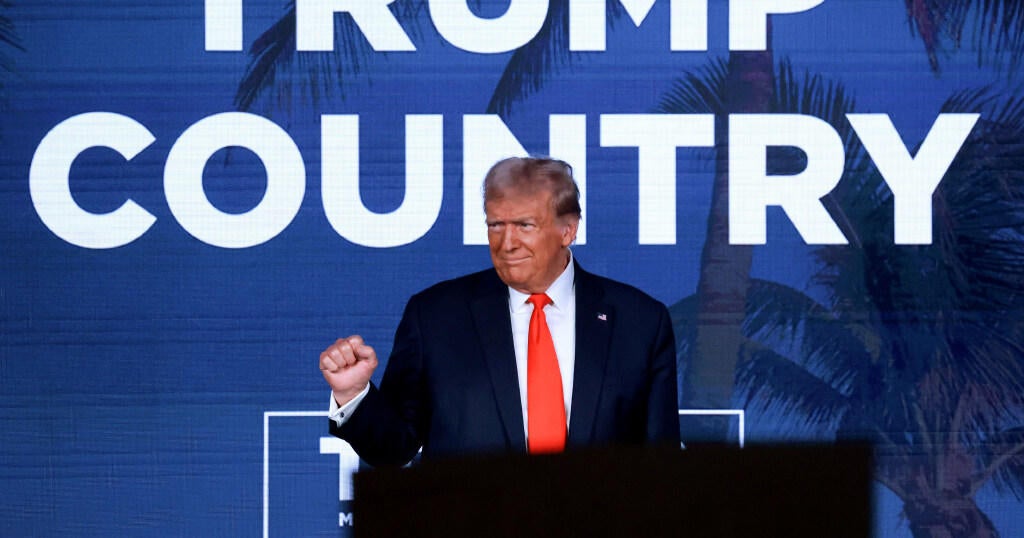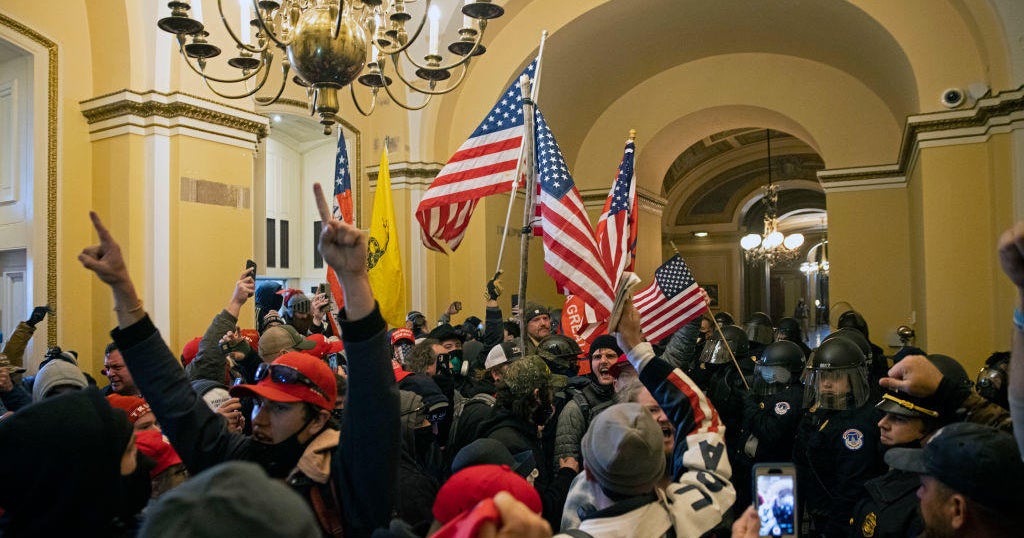Liz Cheney on why she believes Trump's reelection would mean the end of our republic
How do you sound the alarm when people have gotten used to the ringing? That is the challenge for former Congresswoman Liz Cheney, who has had to update even her sense of alarm as Donald Trump's effort to overthrow the last election has not stopped him from becoming the GOP presidential favorite; as an election denier has become Speaker of the House; and as prominent Republicans have come to embrace election conspiracies as the route to political glory.
After losing her 2022 Republican primary, Cheney traded the U.S. Capitol dome for the Thomas Jefferson-designed Rotunda at the University of Virginia, where she has been lecturing on politics, and writing a new book, "Oath and Honor: A Memoir and a Warning" (to be published Tuesday by Little, Brown).
Dickerson asked Cheney if she looks at politics differently today: "Do you say, you know, 'We spend a lot of time demonizing the other side, which put all of our supporters in the mindset of, You know what? They're not just wrong, they're evil'?"
"Yeah, absolutely," she replied. "if everything that a political adversary does is met with, you know, an attack that, 'Oh my God, this is, you know, the worst possible thing you can imagine, this is dire,' then when you face something that really is dire, like we are facing today with respect to Donald Trump and his efforts to unravel the republic, people become numb to the truth, because they feel, like, Well, we've heard that so many times before from politicians."
"You once used to say that nobody could challenge your conservative credentials. What if being a conservative today is defined by one thing: your support for Donald Trump?"
"Well, I know what conservative means," Cheney said. "And I think that the most conservative of all conservative values is fidelity to the Constitution. So, you know, there certainly are people today who are caught in this cult of personality. But that's the opposite of conservative."
"If a person is a member of Congress and they have sworn an oath to defend the Constitution, can they defend the Constitution and also endorse Donald Trump?" asked Dickerson.
"No. It's inconsistent."
"They're breaking with their oath by saying they would like him to be the next president?"
"In my view, fundamentally, there is a choice to be made," Cheney said. "You can't both be for Donald Trump and for the Constitution. You have to choose."
"It's a lot of people who are choosing Donald Trump."
"Yeah. It is."
In the aftermath of the January 6, 2021 attack on the Capitol, Cheney was one of only ten House Republicans who voted to impeach Trump. Soon after, she joined the Democratically-lead committee to investigate the attack.
At the committee's opening hearing in June 2022, Cheney announced, "Tonight, I say this to my Republican colleagues who are defending the indefensible: There will come a day when Donald Trump is gone, but your dishonor will remain."
Once the #3 leader in the House Republican Conference, Cheney was shunned by it. She found an ally in then-Speaker of the House, California Democrat Nancy Pelosi. "I don't know that I had ever spoken more than a few sentences to her, before she called me and asked me to be on the committee," Cheney said. "I learned later that her staff put together for her a list of the top ten worst things Liz Cheney has ever said about Nancy Pelosi, and gave it to her. And she apparently took one look at it and said, 'Why are you bothering me with things that don't matter?'"
Dickerson asked, "Would you take back some of the ten?"
"Oh, sure!" she laughed. "We've all said things about each other that we probably in hindsight wish we hadn't said."
Cheney came to Washington in 2016, along with Donald Trump. Didn't like him, she said, but she supported his policies on issues like abortion and gun control. She voted with him more than 90 percent of the time. "Certainly, I think all of us in the Republican Party watched things unfold to some extent before 2020 and said, 'Well, that's, you know, just Donald Trump. You don't have to take it seriously.' I think what we saw that was different post-2020 election was the actual attempt to overturn the election and seize power."
Cheney's book also details the groundwork laid by Trump's allies in the weeks leading-up to January 6, including by a previously relatively-obscure Louisiana Congressman, Mike Johnson, who in October was elected Speaker of the House. "Mike and I were good friends," Cheney said. "But what I learned was that he was operating in a way that was dangerous. It was dangerous because what Mike was doing was taking steps that he knew to be wrong, doing things that he knew to have no basis in fact or law, or the Constitution. Mike was willing time and again to ignore the rulings of the courts, to ignore what state and federal courts had done and said about the elections in these states, in order to attempt to do Donald Trump's bidding."
Dickerson asked, "So, he was asserting not only facts for which he had no evidence, but which the courts had already ruled had no merit?"
"Right, exactly."
We asked Speaker Mike Johnson for comment. His office tells "Sunday Morning" Cheney's book "does not present an accurate portrayal of those events," and that he wishes her "the best."
Web extra: Liz Cheney on the danger of Republicans embracing Trump
Cheney itemizes each turn with Johnson before January 6 – a lot of attention for a name she expected few of her readers to know, but she felt Johnson's sleight of hand was emblematic of Republicans who don't just go along with Trump's deceptions, but boost them. She had no idea she was writing about a future Speaker.
"The Speaker of the House is a collaborator to overthrow the last election?" asked Dickerson.
"Absolutely," Cheney replied.
"What happens if Mike Johnson's the Speaker on the 6th of January, 2025?"
"He can't be," Cheney said. "You know, we're facing a situation with respect to the 2024 election where it's an existential crisis. And we have to ensure that we don't have a situation where an election that might be thrown into the House of Representatives is overseen by a Republican majority."
"So, you would prefer a Democratic majority?"
"I believe very strongly in those principles and ideals that have defined the Republican Party, but the Republican Party of today has made a choice, and they haven't chosen the Constitution. And so, I do think it presents a threat if the Republicans are in the majority in January 2025."
It's a threat Cheney hopes she can be clear enough about to break through the political numbness.
Dickerson asked, "You say Donald Trump, if he is re-elected, it will be the end of the Republic. What do you mean?"
"He's told us what he will do," Cheney replied. "People who say, 'Well, if he's elected, it's not that dangerous, because we have all of these checks and balances,' don't fully understand the extent to which the Republicans in Congress today have been co-opted. One of the things that we see happening today is sort of a sleepwalking into dictatorship in the United States."
"Is Donald Trump a fascist?"
"I think that he certainly is employing fascist techniques," Cheney said. "I think that the tools that he is using, are tools that we've seen used by authoritarians, fascists, tyrants around the world. The things that he has said and done, in some ways, are so outrageous that we have become numb to them. What I believe is the cause of our time is that we not become numb, that we understand the warning signs, that we understand the danger, and that we ignore partisan politics to stop him."
For more info:
- "Oath and Honor: A Memoir and a Warning" by Liz Cheney (Little, Brown & Co.), in Hardcover, eBook and Audio formats, available December 5 via Amazon, Barnes & Noble and Bookshop.org
- Liz Cheney, UVA Center for Politics, University of Virginia
See also:
- Trump eyes radical immigration shift if elected in 2024, promising mass deportations and ideological screenings
- Trump and allies plot revenge, Justice Department control in a second term (Washington Post)
- Conservatives aim to restructure U.S. government and replace it with Trump's vision (Associated Press)
- Romney says Trump portion of GOP "inclined to a populist demagogue message"
- Mitt Romney on today's Republican Party ("Sunday Morning")
Story produced by Ed Forgotson. Editor: Carol Ross.
for more features.
